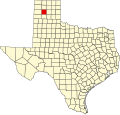Pullman, Texas | |
|---|---|
Historical unincorporated community | |
| Coordinates: 35°11′46″N101°42′24″W / 35.19611°N 101.70667°W | |
| Country | United States |
| State | Texas |
| County | Potter |
| Elevation | 3,602 ft (1,098 m) |
| Time zone | UTC-6 (Central (CST)) |
| • Summer (DST) | UTC-5 (CDT) |
| GNIS feature ID | 1365855 [1] |
Pullman was an unincorporated community in Potter County, located in the U.S. state of Texas. [1] It is now within the city limits of Amarillo.


